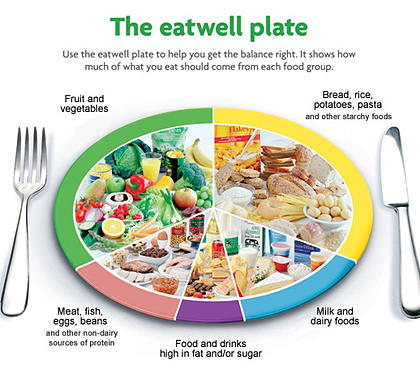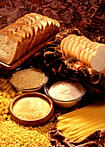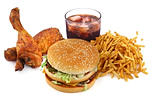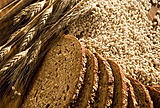Balanced diet
A balanced diet means eating the right type of nutrients at right quantity. We should eat most number of Fruits and Vegetables and Carbohydrates. We should drink less amount of milk and dairy products and eat less foods with protein. Lastly, eat the least amount of fats.
 The range of foods in your diet should include:
plenty of fruit and vegetables
plenty of bread, rice, potatoes, pasta and other starchy foods (choosing wholegrain varieties when possible)
some milk and dairy foods (choosing lower-fat varieties when possible)
some meat, fish, eggs, beans and other non-dairy sources of protein
just a small amount of foods high in fat and sugar
Now what are the nutrients in a balanced diet? let me tell you
Proteins
Carbohydrates
Minerals
Vitamins
Fats
Fibres
Water
The range of foods in your diet should include:
plenty of fruit and vegetables
plenty of bread, rice, potatoes, pasta and other starchy foods (choosing wholegrain varieties when possible)
some milk and dairy foods (choosing lower-fat varieties when possible)
some meat, fish, eggs, beans and other non-dairy sources of protein
just a small amount of foods high in fat and sugar
Now what are the nutrients in a balanced diet? let me tell you
Proteins
Carbohydrates
Minerals
Vitamins
Fats
Fibres
Water
Proteins:
Builds and repairs muscle. When training hard and recovering from injury. ‘Power’ athletes such as weight lifters will eat more proteins.
 Carbohydrates:
Provides quick energy. Athletes in training will eat more carbohydrates . Marathon runners will eat a lot of carbohydrates before the event.
Carbohydrates:
Provides quick energy. Athletes in training will eat more carbohydrates . Marathon runners will eat a lot of carbohydrates before the event.
 Minerals:
Helps release energy from food. Helps decision making. When training hard and competing
Minerals:
Helps release energy from food. Helps decision making. When training hard and competing
 Vitamins:
Helps the body work. Helps concentration. Staying calm, making quick decisions
Vitamins:
Helps the body work. Helps concentration. Staying calm, making quick decisions
 Fats:
Provides slow energy. Walking and low impact exercise - it produces energy too slowly to be used when working hard.
Fats:
Provides slow energy. Walking and low impact exercise - it produces energy too slowly to be used when working hard.
 Fibres:
Can't be digested. Healthy digestion, helps in sport. Also helps you with weight control.
Fibres:
Can't be digested. Healthy digestion, helps in sport. Also helps you with weight control.
 Water:
Maintains water level in our body. It prevents dehydration in our body while we sweat.
Water:
Maintains water level in our body. It prevents dehydration in our body while we sweat.

Accordingly, this what a person's balanced diet is supposed to be. To stay healthy and have a balanced diet follow the following:
Breakfast
One grapefruit
One cup low-fat milk
One cup black coffee or herbal tea ( Adults)
One banana
One cup plain yoghurt with two tablespoons honey
Glass of water
Lunch
Chicken breast , baked or roasted ( for non- vegetarian)
Large garden salad with tomato and onion with one cup croutons, topped with one tablespoon oil and vinegar (For vegetarians)
Glass of water
Snack
One cup carrot slices
Three tablespoon hummus
One-half piece of pita bread
Glass of water or herbal tea
Dinner
One cup steamed broccoli
One cup brown rice
Halibut (four-ounce portion) (Non-vegetarians)
Small garden salad with one cup spinach leaves, tomato and onion, topped with two tablespoons oil and vinegar or salad dressing
Sparkling water with lemon or lime slice
Here is the way to go to the homepage
Homepage
Here is the way to go to athletes diet
Athletes diet
 Carbohydrates:
Provides quick energy. Athletes in training will eat more carbohydrates . Marathon runners will eat a lot of carbohydrates before the event.
Carbohydrates:
Provides quick energy. Athletes in training will eat more carbohydrates . Marathon runners will eat a lot of carbohydrates before the event.
 Minerals:
Helps release energy from food. Helps decision making. When training hard and competing
Minerals:
Helps release energy from food. Helps decision making. When training hard and competing
 Vitamins:
Helps the body work. Helps concentration. Staying calm, making quick decisions
Vitamins:
Helps the body work. Helps concentration. Staying calm, making quick decisions
 Fats:
Provides slow energy. Walking and low impact exercise - it produces energy too slowly to be used when working hard.
Fats:
Provides slow energy. Walking and low impact exercise - it produces energy too slowly to be used when working hard.
 Fibres:
Can't be digested. Healthy digestion, helps in sport. Also helps you with weight control.
Fibres:
Can't be digested. Healthy digestion, helps in sport. Also helps you with weight control.
 Water:
Maintains water level in our body. It prevents dehydration in our body while we sweat.
Water:
Maintains water level in our body. It prevents dehydration in our body while we sweat.

 The range of foods in your diet should include:
plenty of fruit and vegetables
plenty of bread, rice, potatoes, pasta and other starchy foods (choosing wholegrain varieties when possible)
some milk and dairy foods (choosing lower-fat varieties when possible)
some meat, fish, eggs, beans and other non-dairy sources of protein
just a small amount of foods high in fat and sugar
Now what are the nutrients in a balanced diet? let me tell you
Proteins
Carbohydrates
Minerals
Vitamins
Fats
Fibres
Water
The range of foods in your diet should include:
plenty of fruit and vegetables
plenty of bread, rice, potatoes, pasta and other starchy foods (choosing wholegrain varieties when possible)
some milk and dairy foods (choosing lower-fat varieties when possible)
some meat, fish, eggs, beans and other non-dairy sources of protein
just a small amount of foods high in fat and sugar
Now what are the nutrients in a balanced diet? let me tell you
Proteins
Carbohydrates
Minerals
Vitamins
Fats
Fibres
Water